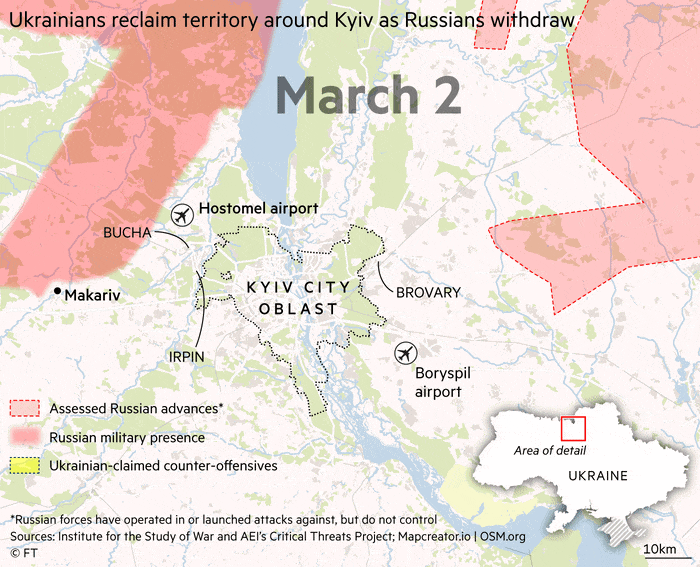The EU is preparing to introduce more sanctions against Moscow after reports of atrocities emerged in the wake of Russia’s military retreat from the outskirts of Kyiv.
Charles Michel, president of the European Council, said further sanctions were “on their way” in response to Russia’s actions in Bucha, a city about 25km north-west of central Kyiv that was under Russian occupation until recently.
“Shocked by haunting images of atrocities committed by Russian army in Kyiv liberated region,” Michel said on Twitter on Sunday. “Further EU sanctions & support are on their way. EU is assisting Ukraine & NGOs in gathering of necessary evidence for pursuit in international courts.”
EU ambassadors are expected to discuss the fresh round of measures on Wednesday, according to a diplomat with knowledge of the plans.
The pledge for more punitive measures against Russia follows strong western condemnation of alleged Russian war crimes on unarmed Ukrainian civilians in recently liberated areas around Kyiv, as Moscow shifts its war focus to the country’s east.
Emine Dzheppar, Ukraine’s deputy foreign minister, said soldiers who had retaken Bucha from Russian forces reported “numerous civilians shot dead”.
“Some of [the] victims have their hands tied. Innocent victims. They didn’t deserve that,” she said.
In the nearby village of Motyzhyn, Russian soldiers also “did terrible things”, she added. “Their cruelty is limitless. Before Ukrainian troops arrived, [the] Russian army killed as many civilians as possible. Inhuman. Terrible. Speechless.”

Images from Bucha were “unbearable”, French president Emmanuel Macron said on Twitter, expressing “compassion” to the “hundreds of civilians cowardly assassinated”. German chancellor Olaf Scholz described “terrible and grisly” scenes emerging from the town, mentioning “roads littered with corpses”.
“You can’t help but see these images as a punch to the gut,” said US secretary of state Antony Blinken, urging the global community against becoming “numb”. Liz Truss, British foreign secretary, also said she was “appalled by atrocities in Bucha and other towns”, adding the UK was collecting evidence of war crimes.
German foreign minister Annalena Baerbock vowed to “intensify sanctions against Russia and provide even more support for the defence of Ukraine”, while her French counterpart Jean-Yves Le Drian called for “the strongest possible international economic pressure” on Moscow.
Estonian prime minister Kaja Kallas asked for “a fifth round of strong EU sanctions as soon as possible”.
Existing EU measures include banning seven Russian banks from the global Swift payments network, a block on exports of key technologies to Russia including for the defence, energy, telecoms and aviation sectors, a ban on Russian airlines from its airspace, and asset freezes against hundreds of Russian oligarchs and officials, including Putin.
Future measures proposed by some member states include more individual sanctions, a ban on Russian ships using EU ports, more export restrictions and embargoes on energy supplies such as coal, oil or gas — long demanded by Ukraine but previously resisted by some major European economies.

Calls for the sanctions to target Russian energy exports — on which the EU heavily depends — have grown louder. In Italy, one of the EU countries most reliant on Russian gas, Enrico Letta, chief of the centre-left Democratic party, a junior partner in prime minister Mario Draghi’s national unity government, called for a “full oil and gas Russia embargo”.
Buying Russian oil and gas was “financing war crimes”, said Lithuania’s foreign minister Gabrielius Landsbergis. The Baltic country declared it was the first in the EU to stop gas imports from Moscow. “Dear EU friends, pull the plug. Don’t be an accomplice,” he added.
Russia’s ministry of defence on Sunday denied accusations of murdering civilians in Bucha, describing the claims as a “provocation”.
“During the time this settlement was under the control of the Russian armed forces, not a single local resident suffered from any violent actions,” it said in a statement, adding that photos and videos of atrocities are “another production of the Kyiv regime for the western media”.
Human Rights Watch said it had documented several cases of unlawful violence it described as “apparent war crimes”, including in the Chernihiv, Kharkiv and Kyiv regions.
The New York-based group said the cases it documented, which included summary executions and rape, indicated “unspeakable, deliberate cruelty and violence against Ukrainian civilians” which should be investigated as war crimes.
Gyunduz Mamedov, a former deputy prosecutor-general of Ukraine and specialist in international criminal law who has visited Irpin and Bucha, said that, in addition to the widespread destruction of infrastructure, he had seen corpses of civilians and freshly dug graves marked with crosses.
He said about 50 per cent of the buildings in Irpin had been damaged and about 300 civilians killed during the Russian offensive.
Nato secretary-general Jens Stoltenberg said such “brutality against civilians” had not been seen in Europe for decades, adding that it was “extremely important” for the International Criminal Court to open an investigation into potential war crimes in Ukraine.
Carla Del Ponte, the former chief prosecutor of UN war crimes tribunals, called on Saturday for an international arrest warrant for Vladimir Putin, describing the Russian president as a “war criminal”.
Meanwhile, Russian negotiators handling peace talks between the two countries said there would be fresh discussions on Monday. Vladimir Medinsky, head of the Russian delegation, said Russia accepted the Ukrainian position with the exception of its stance on Crimea.
Additional reporting by Nastassia Astrasheuskaya in Riga, Guy Chazan in Berlin, Richard Milne in Oslo, Jasmine Cameron-Chileshe in London and Lauren Fedor in Washington
https://news.google.com/__i/rss/rd/articles/CBMiP2h0dHBzOi8vd3d3LmZ0LmNvbS9jb250ZW50Lzg0YjgyNzI2LWQ0ZDAtNDQ2Yy1hNDA5LWY2MTAzNzY4NjMxNdIBAA?oc=5
2022-04-03 17:40:24Z
1326194154
Tidak ada komentar:
Posting Komentar